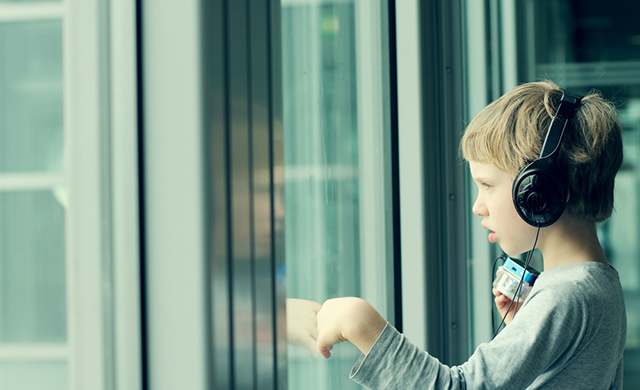
19 Things I Wish I'd Known About Having a Child With Autism
05/21/2019 06:00AM | 5562 viewsBy Ronnie Koenig & Laura T. Coffey
There's a saying that's often repeated because it's true: If you've met one person with autism, you've met one person with autism. That's because children (and adults) on the autism spectrum are very different from one another. There is no one correct road map to follow when raising, teaching and loving them.
1. Don't worry about what other people are thinking
"The most freeing moment of this journey for us was when we stopped worrying about public appearance. Your child needs for you to be 100 percent in tune with them and what they are experiencing, not worried about how you are perceived."
—Sarah McKamey, Manchester, Tennesseee
2. When it comes to autism, one size doesn't fit all
"If you put a PlayStation game into an Xbox, would it work? Of course not. So does that mean the Xbox is broken? No. The same thing applies for a child with autism. Just because they don't learn the way 'typical' children do doesn't mean there is something wrong with them. It means that we as parents, caregivers, friends, neighbors and teachers need to find different ways to try and make a connection."
—Laura Jones, Lambertville, New Jersey
3. It won't always be like this
"During the hardest times, when my son wasn't sleeping or eating or when he melted down over lights and sounds, I wish I knew it wouldn't always be like this. I wish someone would have told me that the child I have now will grow and change and regress and thrive. You will feel frozen in time at different points. Know that it will get better. And harder. It will change."
—Kate Swenson, Cottage Grove, Minnesota
4. Know that medical issues can be involved
"I wish I had known about the invisible medical issues of autism right from the start. For years, I had no idea that gastrointestinal dysfunction, including constipation, acid reflux, inflammation and pain, could dramatically affect my son's sleep patterns, mood, irritability, aggression, attention, and even communication. Our son had to power through those problems all by himself on a daily basis, and it breaks my heart that we never suspected the cause of many of his struggles."
—Janet Lintala, West Virginia
5. It's OK to be sad about your child's autism diagnosis
"I get really sad when I think of the 'normal' childhood my kids have missed. I have no tolerance for parents who complain about having to drive their kids to ballet and soccer and all of their other activities. I wanted to be that mom, and I always envisioned my life would be that way. But now I realize how blessed I am to avoid dealing with drinking, drugs, promiscuousness, social-media bullying and all the other typical teenager problems."
—Alicia Hardigree, Greenville, South Carolina
6. Be grateful for the strong connection you and your child will forge
"In reflecting over the last 24 years of our journey, I will say this: My son gives me 100 kisses and hugs every day, he is always happy to see me and he will always be with me. He doesn't lie and he doesn't judge. He is welcoming to anyone that wants to enter his world. On the other hand, my father sees me about twice a year since we live 1,000 miles apart. So which dad is better off? It's not better or worse, it's just different. Once you understand that, your road will be smoother."
—Scott Sanes, Great Barrington, Massachusetts
7. Prioritize independence and communication
"After baseline medical needs are met and you figure out how to deal with the 'everyday,' I recommend that parents pay particular attention to the areas of communication, self-help and socially appropriate skills. A child who has a high academic ability, but poor communication skills, hygiene or a proclivity to hurt others will greatly limit their opportunities."
—Nicole Sugrue, Port Washington, New York
8. Trust your instincts — even with the doctor's advice
"What I wish I knew way back then is that it's OK to get a second opinion when your gut tells you the doctor is wrong. We knew that Gavin had autism. Yet, we were told he had ADHD, that he had anxiety and depression. It took his first psychiatric hospitalization at age 8 for a psychiatrist to finally say he thought Gavin had Asperger's. We were always told, 'Why is a diagnosis so important to you anyway? It's just a label.' Because the right diagnosis means the proper treatment. Now he has a job, he's involved in school activities. He's going to college in the fall to become a chemistry teacher."
—Shannon Smyth, Lake Ariel, Pennsylvania
9. Try not to read too much into things people say to you
"You will find yourself annoyed with positive comments because they seem to minimize the magnitude of your child's challenges. You will also be annoyed by negative comments that don't recognize the magnitude of your child's progress."
—Lisa Lane, Woodruff, South Carolina
10. The hardest parts of autism are often unseen by the outside world
"My daughter can appear to be 'fine' at a party, but later that night will likely be a nightmare. I think this is what can make autism so very lonely. It is a war fought mostly behind closed doors."
—Lacy Gunter, Greenwood, South Carolina
11. Seek out a mentor
"Looking back, it would have been helpful to have had a mentor or someone who had already walked the road that I faced. Initially, the diagnosis was overwhelming. Just as a driver on a road trip stops at visitor centers for information, I found myself searching for directions on how to not only cope with the future as his primary caregiver, but also how to fund his immediate and future medical expenses and care. My experiences have instilled in me a desire to mentor those with whom I come in contact who are facing the future I faced."
—Lisa Bamburg, Jacksonville, Arkansas
RELATED: I know what causes autism
12. When you change your expectations, the world will grow
"I wish we knew that autism just means different, not less. Instead of baseball games in elementary school we would have sensory integration programs. I wish we knew then that it will be OK — some days will be hard, some days will be beautiful and at the end of each of them when we tuck our son into bed, the most important thing we can do is make sure he knows he is loved."
—Tabatha and Tony Rainwater, Knoxville, Tennessee
13. Celebrate all of your child's achievements
"I wish I had known that unlike other parents we can't take even the smallest achievement or milestone for granted. When our son started wearing his coat without a fight and expressed that he was cold, when he was able to participate in circle time during music class and when he got up on stage with the other kids at his school show — we celebrated."
—Steven Grossman, Los Angeles
14. Autism does not equal a lack of empathy
"We need to eradicate the idea that people on the spectrum are unfeeling and consider that perhaps some of the behaviors we don't understand are because they in fact feel more than those of us who are not on the spectrum."
—Lauren Casper, Lexington, Virginia
15. Your child with autism may bring out the best in your family
"Our son is the oldest of our three children, and he has taught us all the importance of kindness, patience, compassion, listening and respect. These attributes allow our family to keep a very grounded and real perspective on what is truly important in life vs. what is fleeting, frivolous or simply not worthy of our energy."
—Stephanie Martin, Greenville, South Carolina
16. Having a child on the spectrum can be like a reboot to your life
"It's exciting and challenging because each day holds a new adventure. Despite the challenges of having a child on the spectrum, my life is perfectly complete. My son challenges me to be a better parent every single day."
—Yolanda Holmes, Greenville, South Carolina
17. Remember to live your own life and take care of yourself
"Take up yoga. Kiss your husband. Create beautiful bowls out of clay. Do whatever it is that lights you up inside — all the things that made you feel whole, and alive, and good before autism darkened your doorstep."
—Carrie Cariello, Bedford, New Hampshire
18. Four legs and fur may change your child's world and give you hope
"We were on an endless search for that one thing that was going to make the difference for our son ... and then we adopted Xena, a severely abused and neglected puppy. The moment my son and Xena met, there was an immediate and undeniable bond. He spoke freely to her; he sang to her; he played with her. They were inseparable. We spent years and thousands of dollars on therapy hoping to accomplish what this dog was able to attain instantly. My son finally had a relationship where there was no judgment or expectations placed on him, but there was a friendship that allowed him to let it all go, open up and be himself. I am not saying that all families living with autism should have a dog, but I will say that miracles do come true, and your miracle may be at your local shelter waiting for you."
—Linda Hickey, Johns Creek, Georgia
19. This is a great time to parent a child with autism
"I am grateful that we live in the times that we do. So much new information has been discovered about autism. We live in the age of the internet and I can connect with another autism mom who lives several states or even countries over and talk about our shared experiences. I am grateful to have things like iPads that not only help my son communicate but also gives us a chance to share a moment while watching one of his favorite YouTube clips. A tip of my cap to the families that went before us. They really helped pave the way for the benefits my son has now. I hope I can do the same for the ones coming behind us."











Post your Comment
Please login or sign up to comment
Comments